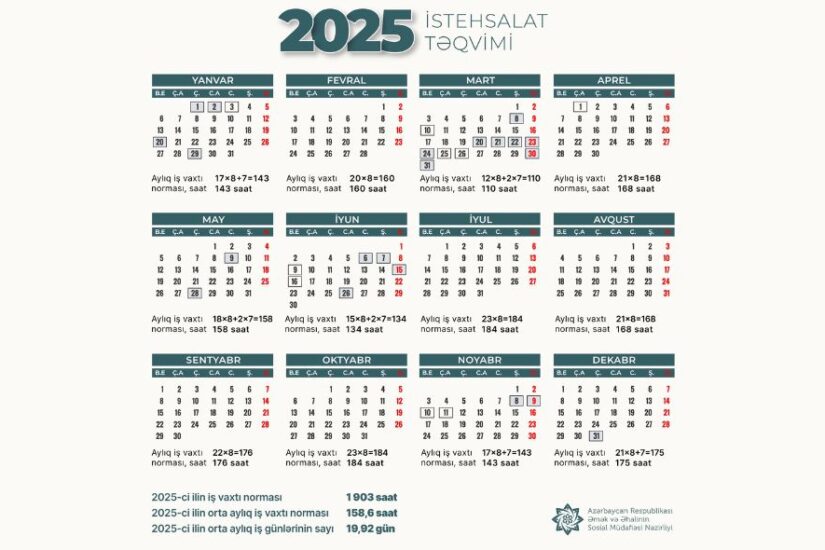The calculation of leave is one of the most important rights in every employee’s working life. It is the employer’s obligation to ensure this right in accordance with the applicable legislation. In Azerbaijan, the existing labor laws clearly define employees’ leave entitlements and set out the correct calculation procedures. At SGF CONSULTING, we approach this topic with legal precision and provide professional support to all our clients.
What is Leave and Who is Entitled to It?
Leave is the right of an employee to be temporarily released from work for a certain period while continuing to receive their salary. This right is regulated by the Labor Code of the Republic of Azerbaijan.
The Legal Basis for Leave Entitlement
According to the Labor Code of the Republic of Azerbaijan, every employee working under an employment contract is entitled to leave. The main types of leave include annual paid leave, social leave, and unpaid leave, all of which are guaranteed by the state.
Who Can Benefit from Leave Rights?
The right to leave applies to all employees working under permanent, fixed-term, or seasonal contracts. Government employees, teachers, doctors, office workers, and all other individuals engaged in labor activities are eligible for this right. Special categories—such as women, individuals with disabilities, and parents with young children—are granted additional benefits and privileges.
Types of Leave
- Annual Paid Leave – According to the Labor Code, every employee is entitled to annual paid leave. The minimum duration is typically 21 calendar days, but this period can be extended based on factors such as the employee’s length of service, job position, or exposure to hazardous working conditions. For example, teachers may be entitled to up to 56 days of annual leave.
- Social Leave – Social leave is granted for reasons such as childbirth, childcare, family circumstances, or other social matters. This type of leave is also protected by law and gives employees the legal right to be temporarily absent from work due to personal or family situations.
- Unpaid Leave – Unpaid leave may be granted at the employee’s personal request. During this period, the employee’s salary is not paid; however, their position at the company is preserved. The Labor Code also specifies the maximum duration and the conditions under which unpaid leave can be granted.
How is Leave Duration Determined?
- Minimum Duration of Annual Paid Leave – According to the legislation, the minimum annual paid leave for employees is 21 calendar days. However, this duration may be extended for public sector employees, as well as those working in education and healthcare.
- Additional Leave Days – Additional leave days are granted to employees working in hazardous or dangerous conditions, to those with long service records, or to individuals in special social categories. These cases are clearly outlined in Articles 117 and 118 of the Labor Code.
Preparation of Leave Schedules
- Creating an Annual Leave Plan – Employers are required to prepare an annual leave schedule in advance. This schedule ensures that employees can take their rest periods without disrupting the workflow. The Labor Code provides flexibility, allowing both the employer and the employee to mutually agree on the leave dates.
- Distribution of Leave Among Employees – In large organizations, allowing multiple employees to take leave at the same time may disrupt production or operational processes. Therefore, it is essential to carefully plan and distribute leave periods among employees to maintain smooth business operations.
Method of Calculating Leave Payment
During annual paid leave, employees are compensated based on their average salary. The average daily wage is calculated by dividing the employee’s total earnings over the past 12 months by the total number of working days within that period. The result is then multiplied by the number of leave days.
Example of Salary-Based Calculation
For example, if an employee’s total earnings over the past 12 months amount to 10,800 AZN, and there were 252 working days during this period:
- Average daily wage: 10,800 AZN ÷ 252 days = 42.85 AZN
- Leave payment for 21 days: 42.85 AZN × 21 days = 900 AZN
How is Leave Payment Processed?
Taxation and Social Insurance Deductions
Leave payments are subject to the same taxation rules as regular wages. Social insurance contributions are also deducted from leave payments. These procedures are strictly regulated by law and must be properly reported to the tax authorities.
Timing of Leave Payment
According to the Labor Code, leave payments must be fully paid to the employee before the leave begins, typically on the employee’s last working day prior to starting the leave.
Cases of Postponing Leave
Sometimes, due to production or organizational needs, an employee’s planned leave may need to be postponed. Such cases are strictly limited by legislation and are only allowed with the written consent of the employee.
Legal Grounds for Postponement
According to the Labor Code, the employer may postpone leave only in cases of essential production requirements. In all circumstances, the unused leave must be fully granted to the employee within the following year. Postponement cannot exceed a period of two years.
Employer’s Obligations in Case of Postponement
If leave is postponed, the employer is required to inform the employee in writing, provide a revised leave schedule, and ensure that the leave payment is made on time. Failure to comply with these obligations gives the employee the right to appeal to the Labor Inspectorate or the courts.
Leave and Sick Leave
It is possible for an employee to fall ill while on leave. In such cases, the legislation provides for specific regulations.
How Does Illness Affect Leave?
If an employee submits a sick leave certificate during their annual leave, the sick days are not counted as part of the leave period. The employee’s leave days are restored, and the sick leave period is compensated separately under sick leave payment rules.
Special Cases in Labor Legislation
If the employee fails to submit the sick leave certificate on time or if it is improperly documented, the days of illness may be counted as part of the leave. Therefore, the employee must provide all supporting medical documents to the employer in a timely and proper manner.
Employment Contract Status During Leave
- Calculation of Leave Upon Termination of Employment
When an employment contract is terminated, the employee must be compensated for any unused leave days. This compensation is calculated based on the employee’s length of service and the average wage.
For example, if an employee resigns mid-year and has 10 unused leave days, the payment for those days must be calculated based on the average daily wage and fully paid to the employee.
- Compensation for Unused Leave Days
According to Article 141 of the Labor Code, failure to compensate for unused leave days is considered illegal. This right is essential for the legal protection of the employee.
Leave Disputes and Resolution Methods
The Most Common Disputes:
- Failure to grant leave on time
- Delayed leave payments
- Unlawful postponement of leave
- Non-payment for unused leave days
Legal Procedures and Filing a Complaint
If the employer violates the employee’s leave rights, the employee must first submit a written complaint to the company’s management. If the issue is not resolved, the employee has the legal right to escalate the complaint to the Labor Inspectorate or take the matter to court.
Accurate Leave Calculation with SGF CONSULTING
Professional Legal Advice and Audit Services
We offer our clients the following services:
- Preparation of leave schedules
- Verification of leave calculations
- Legal documentation
- Court representation and support in case of disputes
Frequently Asked Questions About Leave Calculation
Yes, a newly hired employee becomes entitled to annual paid leave after completing 6 months of employment.
Yes, it can be carried over, but for a maximum period of 2 years.
No, this is considered illegal. Termination during leave can only occur if the employee requests it themselves or if there is a legal basis for termination.
Unpaid leave is granted upon the employee’s request due to family circumstances, education, or personal matters.
Leave payment is usually made before the employee starts the leave, typically on the last working day.
Yes, if the employee cannot use the postponed leave in the following year, compensation must be paid in lieu of leave.
Conclusion and Recommendations
Accurate calculation of leave is essential for the protection of employee rights. Employers who act in compliance with the law avoid fines and disputes. At SGF CONSULTING, our team of professional legal experts makes this process easy for you by providing reliable support.









